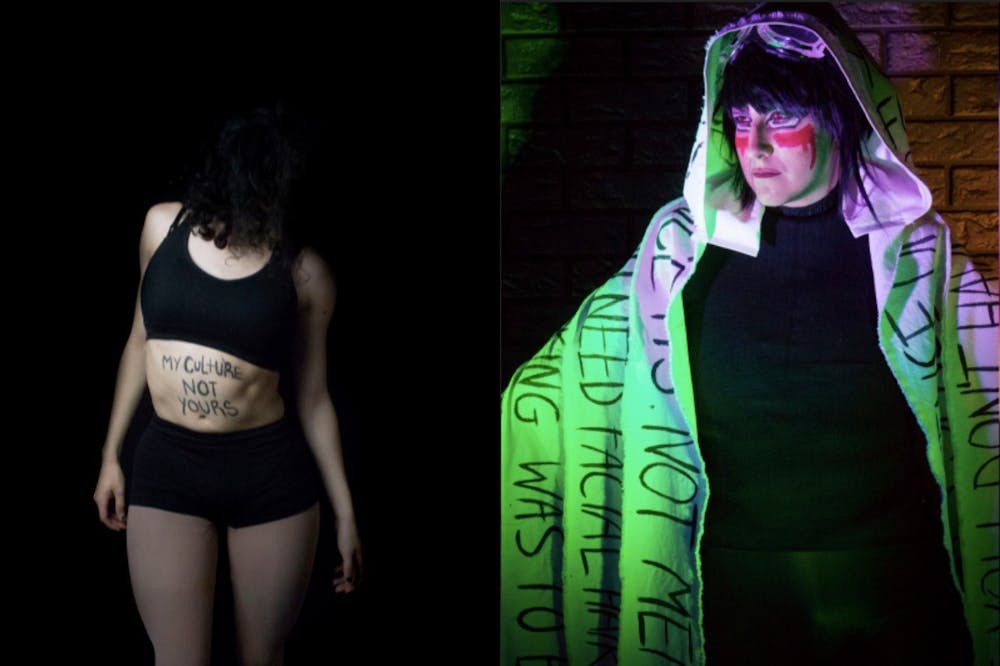Penn’s first LGBTQIA+ general interest magazine has released its first issue.
After running into each another at the spring 2019 launch party of La Vida, Penn's Latinx-interest magazine, rising College seniors Ana Acevedo and Liam Forsythe realized they needed to create a magazine for the University's LGBTQIA+ community.
One year later, Acevedo and Forsythe are the co-creators of Q-INE, Penn's first LGBTQIA+ general interest magazine, and recently launched the publication's inaugural issue on June 1.
The inaugural issue of Q-INE, pronounced 'queen,' features essays, poetry, and photography created by 26 members of Penn's LGBTQIA+ community, including undergraduate and graduate students, as well as faculty and staff.
The Colors Project, a publication aimed at giving a voice to Penn LGBTQIA+ identifying people of color, released its first issue in fall 2011. Since 2015, however, The Colors Project has not published new issues or posts to the group's Facebook page.
Acevedo said that while Q-INE primarily consists of poems and essays, it is not solely a literary magazine. The publication, she said, is a space for cultural commentary, creative writing, and visual artwork across mediums. She said she hopes future issues will include written interview profiles and feature audio recordings on topics important to the LGBTQIA+ community.
“I think being more than just a space for people to publish their incredible poetry, we also want [Q-INE] to be a place where people can write op-eds and concerns to the university and greater Philadelphia or U.S. politics,” Acevedo said.
The co-creators primarily recruited editors and contributors throughout the fall 2019 semester through information sessions, the Kelly Writers House activities fair, and advertisements on-campus groups' listservs. The University's LGBT Center also placed Acevedo and Forsythe in contact with students who had extensive experience with on-campus literary publications, which Acevedo said was critical as neither herself nor Forsythe had previously worked on a magazine.
RELATED:
Pride in a pandemic: LGBTQIA+ students discuss isolation, intersectional activism
Penn outlines four possible scenarios for fall 2020, will finalize plan by end of June
In addition to Acevedo and Forsythe, the magazine brought on five additional editors, including rising College sophomore Peyton Toups.
Toups said he joined Q-INE’s editorial staff because the publication combines two of his interests: LGBTQIA+ topics and literature. He also appreciates Q-INE as a space where he can express his identity while supporting other LGBTQIA+ voices on campus.

Q-INE's spring 2020 inaugural edition (Photo from Q-INE board)
After collecting and editing the final 26 submissions in late February, the magazine's editorial staff planned to design the magazine and distribute its print copies in early spring. Once the COVID-19 pandemic brought on-campus operations to a halt in mid-March, Q-INE staff was forced to postpone the print publication launch and move its work entirely online.
To finish the layout process of the first issue, the magazine's editorial staff held weekly online meetings and used Adobe InDesign software subscriptions provided by Penn. The magazine’s design editor assembled a layout template, and the entire Q-INE team collaborated to complete the issue after completing final exams in early May.
“It was a very all-hands-on-deck kind of operation, because this was our first issue ever,” Toups said.
Q-INE was launched on the first day of June to honor the start of Pride Month.
Acevedo and Forsythe said they hope the publication will help the Penn LGBTQIA+ community feel more connected to each other and to the University, especially during the isolation brought on by the COVID-19 pandemic.
“I would just hope that people are able to read the magazine and feel a little empowered, feel a little creative, and feel a little happy,” Acevedo said.
Acevedo and Toups believe the magazine will be particularly comforting for incoming, prospective, and closeted students who identify as LGBTQIA+. Just seeing the names of other LGBTQIA+ identifying students in each issue’s Table of Contents, they said, is a reminder of the community’s presence on-campus.
Q-INE plans to publish roughly one print issue per year. Though the magazine limited its content submissions to Penn’s LGBTQIA+ community this year, Forsythe said the magazine may allow for submissions from LGBTQIA+-identifying individuals outside of the University in future years.
Plans for the magazine's next issue are dependent on Penn's forthcoming decision regarding a return to campus, which is expected to be released in June. Acevedo said she hopes Q-INE will be able to distribute print copies of its inaugural June issue in August and release its second print issue in spring 2021.









